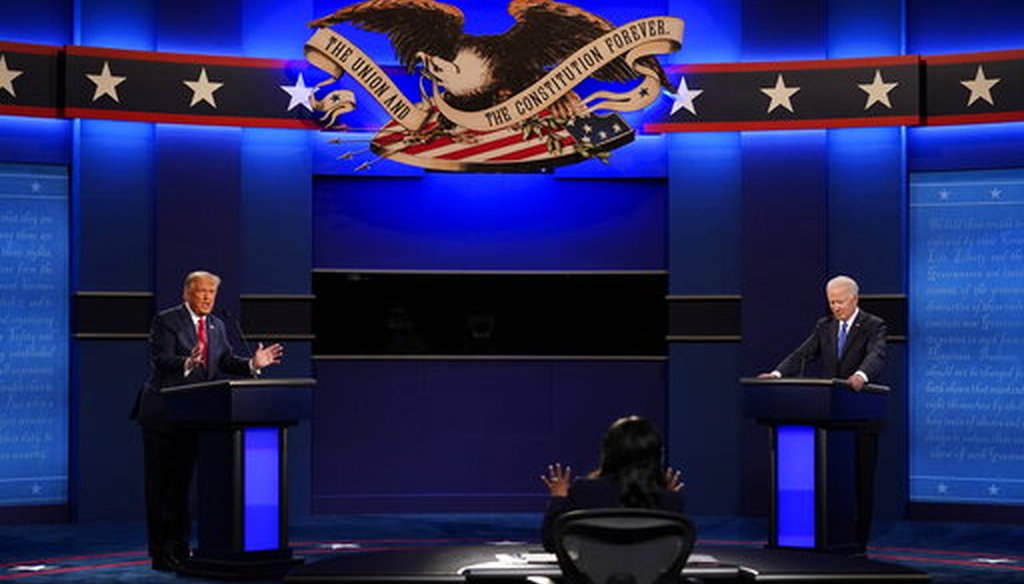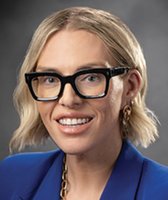From the point of view of moderator Chris Wallace of Fox News, the first 2020 presidential debate between Donald Trump and Joe Biden seemed promising — at least for the first few moments.
"My initial reaction was, ‘This is great — they’re going to engage with each other!’" Wallace said. "Not long after, you began to feel, ‘This is getting out of control.’"
Trump’s constant interruptions of Biden with contradictions and put-downs ultimately made the debate impossible for viewers to follow. Goaded by frustration, Biden hit back, calling Trump "a clown" and telling him to "shut up."
At one point, Wallace said, the producer in his earpiece told him, "Stop Trump from interrupting Biden!" Wallace said he thought to himself, "What does he expect me to do, hit a trap door on the president of the United States? There’s not much you can do in that situation."
Wallace said he thought that Trump’s aggressive approach in the debate "was very bad strategy. It became clear he was hurting himself more than Biden."
Debate organizers came up with an idea for the next debate: a hastily arranged microphone-mute function.
In their first joint interview since the election, the moderators and organizers agreed that the mute button unveiled for the final debate served its purpose, helping tame the unruliness that hampered the initial presidential debate.
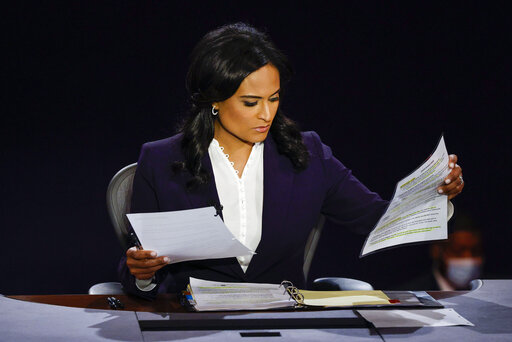
Moderator Kristen Welker of NBC News at the final presidential debate on Oct. 22, 2020. (Pool via AP)
"I was pleased" by how the mute function operated, Kristen Welker, the NBC correspondent and anchor who moderated the third debate, said in a Nov. 23 webinar sponsored by the George Washington University School of Media and Public Affairs and moderated by Frank Sesno, the school’s director of strategic initiatives. "I don’t think there were any moments of a technical difficulty or where it threw the candidates off."
Frank J. Fahrenkopf Jr. and Kenneth Wollack, two of the three co-chairs of the Commission on Presidential Debates, said during the webinar that making the mute button permanent will be considered at the commission’s next meeting early next year. Contrary to what some have assumed, the mute function was operated by commission staff rather than Welker.
Fahrenkopf said the commission didn’t want to unilaterally create a new rule for the final debate, but instead considered the mute button a way to enforce the existing equal time rules that the two candidates’ camps had agreed to.
In the end, the mute button was barely used in the debate, Fahrenkopf said. But its presence helped focus the two candidates on sticking to the rules they’d consented to. When the candidates did their pre-debate walk-throughs, "they were not only conscious of (the mute function) but they practiced it," Wollack said.
The moderators also discussed their efforts to prepare for the debate. Welker followed the most unusual approach of the three, leaving her everyday beat immediately but conducting intensive reporting to inform her questions. Among the sources she reached out to were teachers in Tulsa and Pasadena, Calif.; a small-business owner in Baltimore; a family living near oil rigs in Port Arthur, Texas; and undecided voters in Ohio, Pennsylvania, Virginia, and Florida.
Welker didn’t ask her contacts what she should ask the candidates, but rather what issues mattered most to them. "I didn’t want it to be a ‘Washington debate,’" she said.
Welker added that she "absolutely felt nervous" before the debate. "If you’re not feeling nervous going into these debates, you’re not human," she said.
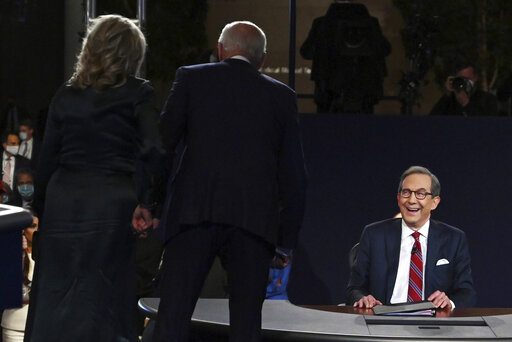
Democratic presidential candidate Joe Biden and his wife Jill Biden talk with moderator Chris Wallace of Fox News after the first presidential debate on Sept. 29, 2020, in Cleveland. (AP)
In the webinar, Wallace reflected on the chaotic first debate he moderated, saying he’s not sure he’ll ever want to rewatch it himself.
Asked during the webinar whether he felt like moderating the debate was a little like parenting, Wallace said, "As the father of six children and the grandfather of seven, no. My children and grandchildren are much better behaved," he said.
Another debate-season crisis emerged when Trump was infected with the coronavirus days after the initial debate. The commission decided to make the second debate virtual rather than in-person.
"He had been up on the stage without a mask with all our crew, and they were deeply concerned about their own welfare and that of their families," Wollack of the debate commission said. "We felt we had to do something, and we decided to do it virtually. Everyone has been doing things virtually" during the pandemic. There had even been a virtual debate in 1960 between John F. Kennedy and Richard Nixon, he said.
But Trump responded that he wouldn’t do a virtual debate, and Biden quickly announced they would do a televised town hall instead. Trump announced his own televised town hall that would air at the same time as Biden’s.
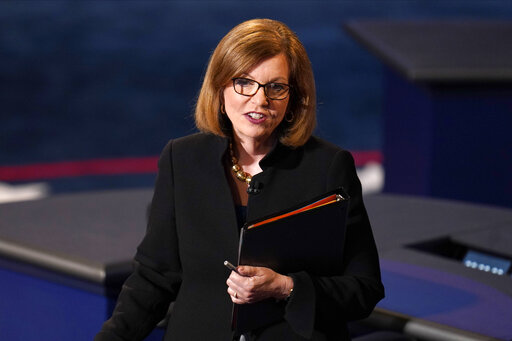
Susan Page, the Washington Bureau Chief for USA Today, arrives to moderate the vice presidential debate on Oct. 7, 2020, in Salt Lake City. (AP)
Meanwhile, the debate between Vice President Mike Pence and Sen. Kamala Harris, D-Calif., went more smoothly than the first presidential debate, but it came with its own challenges, said Susan Page, the USA Today Washington bureau chief who served as moderator.
Page was asked during the webinar whether she could have pushed harder when the candidates were evasive in answering a question about the presidential candidates’ advanced ages. Page said she acted cautiously because she was concerned that pressing harder might have given Pence an opportunity to stonewall further, taking even more time.
"I was trying to make sure they had roughly equal time to talk," she said. "After about 15 minutes, the director of the debate said in my ear that Pence was getting lots more time." Page was able to even out the candidates’ time by the end of the debate, but she acknowledged that doing so came at a cost. "If had to do it over again, I would have been more aggressive," she said.
Page added that she decided against taking up a fact-checking role as moderator.
"I viewed myself as a facilitator of debate," she said. "I knew there were going to be a lot of other people fact-checking this debate."
